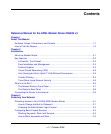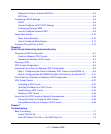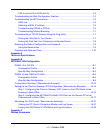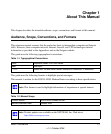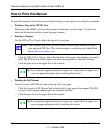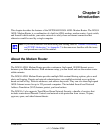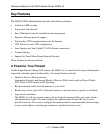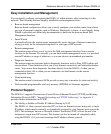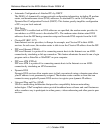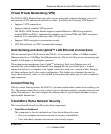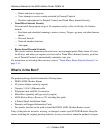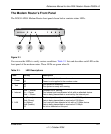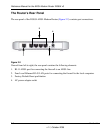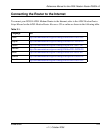
Reference Manual for the ADSL Modem Router DG834 v3
Introduction 2-3
v1.1, October 2006
Easy Installation and Management
You can install, configure, and operate the DG834 v3 within minutes after connecting it to the
network. The following features simplify installation and management tasks:
• Browser-based management
Browser-based configuration allows you to easily configure your modem router from almost
any type of personal computer, such as Windows, Macintosh, or Linux. A user-friendly Setup
Wizard is provided and online help documentation is built into the browser-based Web
Management Interface.
• Smart Wizard
A wizard built into the modem router automatically senses the type of Internet connection,
asking you only for the information required for your type of ISP account.
• Remote management
The modem router allows you to log in to the Web management interface from a remote
location via the Internet. For security, you can limit remote management access to a specified
remote IP address or range of addresses, or you can choose a nonstandard port number.
• Diagnostic functions
The modem router incorporates built-in diagnostic functions such as Ping, DNS lookup, and
remote reboot. These functions allow you to test Internet connectivity and reboot the modem
router. You can use these diagnostic functions directly from the DG834 v3 when you are
connected on the LAN or when you are connected over the Internet via the remote
management function.
• Visual monitoring
The modem router’s front panel LEDs provide an easy way to monitor its status and activity.
• Flash erasable programmable read-only memory (EPROM) for firmware upgrades.
Protocol Support
The DG834 v3 supports Transmission Control Protocol/Internet Protocol (TCP/IP) and Routing
Information Protocol (RIP). “Internet Networking and TCP/IP Addressing:” in Appendix C
provides further information on TCP/IP.
• The Ability to Enable or Disable IP Address Sharing by NAT
The DG834 v3 allows several networked PCs to share an Internet account using only a single
IP address, which may be statically or dynamically assigned by your Internet service provider
(ISP). This technique, known as Network Address Translation (NAT), allows the use of an
inexpensive single-user ISP account. This feature can also be turned off completely while
using the DG834 v3 if you want to manage the IP address scheme yourself.



